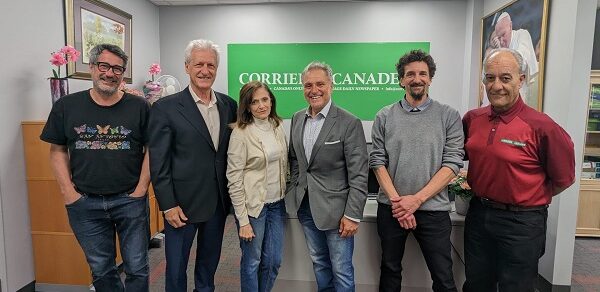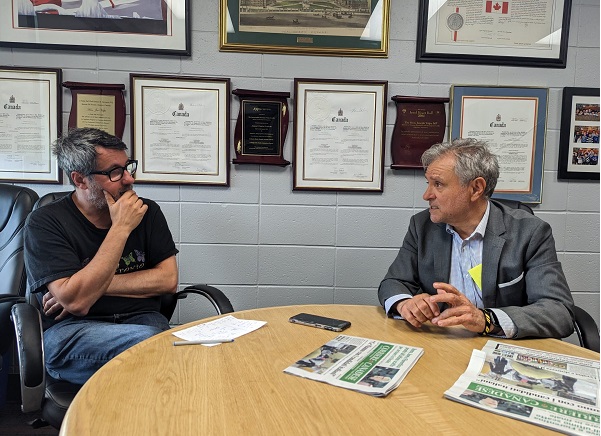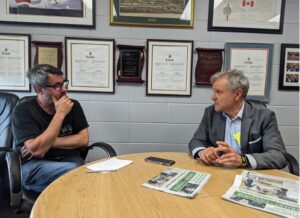Toronto mayoral by-election, Corriere Canadese interviews Anthony Perruzza: “No Torontonians’ money anymore to the Province”
Today, Corriere Canadese is publishing another interview on the contending candidates seeking election as Mayor of Toronto. 102 individuals have registered with the Elections Office at City Hall, and the Italian newspaper will not be able to give all of them the coverage they might like, so it proposes, but will not be limited to, interviewing interested candidates whom “the polls” suggest may garner at least 4% of the votes.
TORONTO – A smart city, with simple solutions for big problems. But, first of all, no Torontonians’ money anymore to the Province: “With me as a Mayor, the 2.2 billion dollars we give yearly to the Province will stay here, in Toronto. I’m not giving all that money to the Province anymore”.
Anthony Perruzza, candidate for Mayor of Toronto, starts our interview making clear that he will fight for Toronto and Torontonians, to make the city safer, more affordable and smarter. And less poor, in terms of budget.
He has a lot of experience inside the City. 63 years old, he was born in Italy; and, he moved to Canada at age nine. He grew up in a working-class family in North York; became a carpenter in his teens and he paid his way through university where he studied history and political science at York University. He has served on Toronto City Council since 2006 (he currently represents Ward 7 Humber River – Black Creek); was a North York councilor from 1988 to 1990, and served in the Legislative Assembly of Ontario from 1990 to 1995 as a member of the New Democratic Party (NDP). Now, Perruzza is candidate for Mayor of Toronto.
Safety: on the streets, on TTC buses, in the subway stations, people don’t feel safe anymore. Do you have a plan to make the city safer?
“Safety is an important issue, no question about it: it’s a big issue for all of us, people need and want to feel safe. And especially now, safety is related to public transit: in the TTC we are experiencing a sort of a rush of violence over the past years especially as we came out of the pandemic. I think it might be good to extend the ‘neighbourhood officer program’ onto the TTC, but it just can’t be only policing, because of the type of people that are on the ‘system’. By that, I mean our city is moving into another area, the area of mental health… we are dealing with mental health in a much bigger way. And dealing with mental health is a very big and expensive proposition. We need resources to be able to deal with that. But, for safety in our quarters, we can also do a lot of very simple things that don’t cost a lot of money: upping the lighting, for example. I come from a district, Jane and Finch, where we had a lot of problems regarding safety. Sometimes it’s enough to make simple improvements on spaces and places like the parks, the laneways… some more attention can make these places safer for people. And we have to listen more: allowing neighbourhoods to decide how money is spent, for example. They know what their quarters need. And let me add another thing: helping families is related to safety. We have to do something for them, starting with after-school-supports for parents”.
Another big problem is traffic: to drive in this city is insane…
“Two things. First, we need to have a much better functioning TTC. It can’t be about cutting services and it can’t be about raising TTC fares. We need to look at the TTC as a public service: it needs to be funded by the public, by everybody, because if I drive a car, every person who gets on the TTC leaves a space for me on the street. And we should all be contributing to that. So: better services, more reliable and affordable. The second thing: smarter construction projects. What we don’t do and what we should do, is: force the contractors to show us how they are going to occupy public spaces on the streets. Often, they dig up the road on both sides of the street: they have big machines, a lot of equipment and stuff, all stored on the street, even if there are only few people to work on that site. And it will be like that for the entire duration of the project. We can change this: they can store their machines, their equipment, all the construction materials in another place (a park close by or a rented space away from the street), to keep the road free; they can work first on one side of the street and only when the work is finished they start on the other side. When they have to work in the middle of the road, they can do it starting from 7pm until 7am, during the night. Simple solutions, to have a minimal impact on the traffic. We have to put all of these things in the contracts, asking constructors: you show me how are you going to do the job and if you don’t do it as you promised in the contract, you have penalties. And to the constructors who don’t specify how they are going to organize the job, we say: ‘next’. The word is: smart. With little things, without spending a lot of money and without big changes, we can solve this issue”.
Home prices are crazy: have you a plan for an affordable housing?
“I am the only one with a plan. Without using City money, money that City doesn’t, and will never, have. The other candidates are talking about millions of dollars for their housing plans: I repeat, money that City will never have. My plan is to adopt a smart housing solution that already works: the Quad at York University. This plan is simple: provide the City of Toronto land sites (including those currently allocated to ‘Housing Now’) on long term leases; facilitate further cost-savings for builders through property tax breaks and city fee breaks; involve CMHC for loan guarantees to further reduce the costs of building. In this way, we can quickly build housing that is truly affordable and provide single units at less than $1000/month. And they are constructed with durable stuff; they are amazing units. This plan is flexible: it can either be built and operated by private operators or by the public sector. ‘Housing Now’ tried to leverage affordable housing units out of market units through density boosts and development charge breaks. It doesn’t work. My plan will work; it’s the only possible one, with no money from the City”.
Listening to all the candidates, it seems that John Tory really didn’t do a good job, because this city has a lot of problems. The question is: why no one ever complained before this campaign?
“I didn’t agree with many decisions of the previous administrations. For example, I never supported ‘SmartTrack’ (the project to construct new transit stations, ndr). I never voted for it. And I didn’t agree when John Tory came with the proposal to re-align the Gardiner Expressway: I thought it was too close to the lake, it didn’t make sense. I can provide a lot of examples. Historically, I’ve been in the room with four different mayors and a premier when they made bad decisions and when they made good decisions: I’ve been there long enough to see when bad decisons were going to be made, and I said no, I don’t like it, I’m not doing that”.
What is central in Anthony Perruzza’s program?
“The only big idea on the table in this election campaign, is my idea. This one: we collect 2.2 billion dollars in property tax moneys that we basically return to the provincial government every single year. The City collects all this money, the Province takes it. We have a 1.4 billion deficit this year and only to catch up to inflation you have to increase property taxes. That’s not possible. The only idea on the table is for us to say: ‘Look, we are collecting 2.2 billion dollars yearly and they have to stay here, in Toronto, because they are paid by Torontonians’. It doesn’t make any sense to give that money to the Province; there is no reason to do it. That money needs to stay here and, as a Mayor, I will do anything to make that happen. It’s not a legal fact, it’s a political fact. We can’t do it anymore. If the Province wants to get more money, it will have to do so by itself. We will not collect Torontonians’ money for the Province, not anymore”.
Will you use the new Mayor’s “super” powers?
“I think you need the majority of people to agree with you, because if you are governing with the support of a minority and you do something with the support of only few people, you probably should not be doing it, because the majority of people disagree with you and with your project. Leadership is about bringing people with you, not perpetually having people fighting against you, because in this way you can’t have things done in the best way. I will approach governing from that perspective”.





